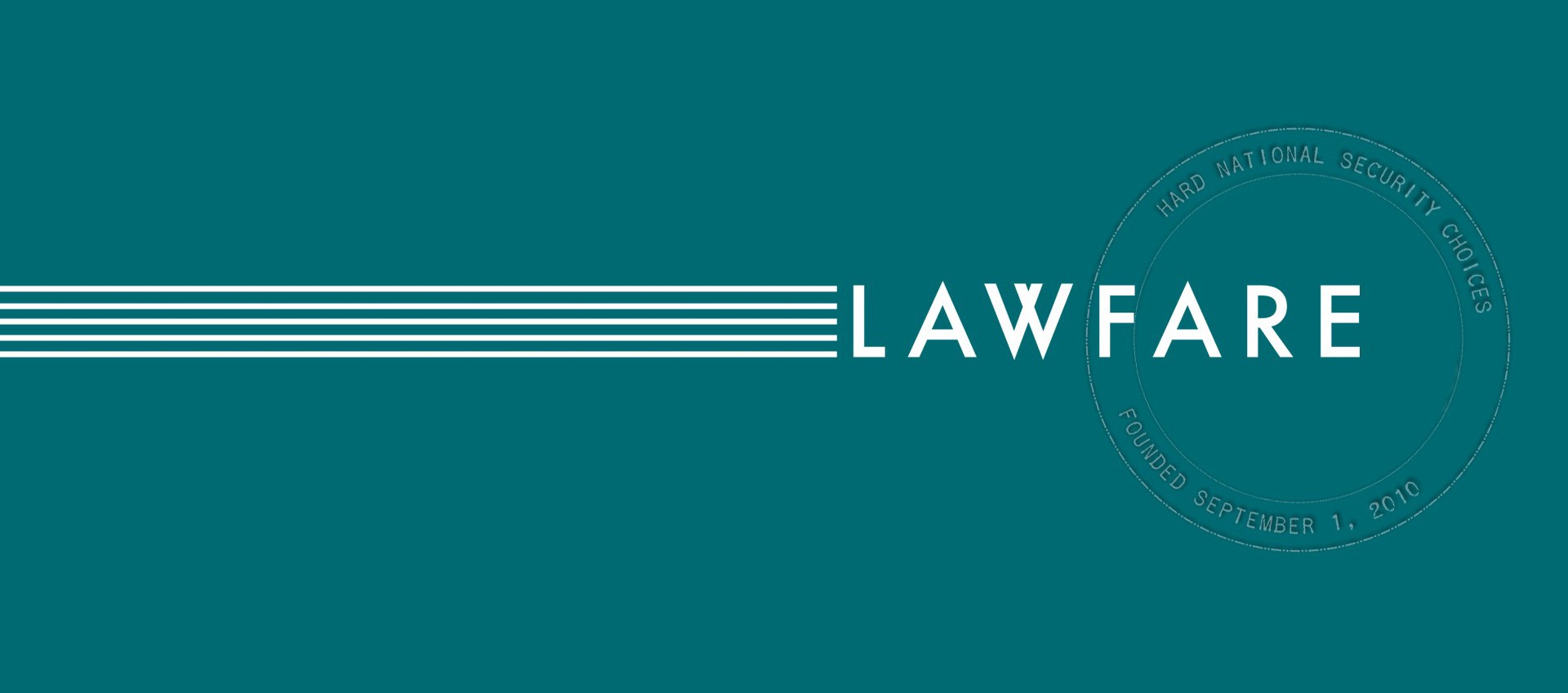Published by The Lawfare Institute
in Cooperation With

Chinmayi Sharma, John Speed Meyers, and James Howison discussed the issue of open source software security, the substance of the Securing Open Source Software Act—which defines the federal government’s role in regard to open source software security issues—and argued for a legal liability regime to improve the security of open source software.
Matthias Schulze discussed the lack of data on cyber conflicts available to the public and the creation of a cyber conflict dataset featuring data on cyber incidents that have prompted policy responses from targeted nations. Schulze argued that the new data set should prompt proportionate responses to future incidents in keeping with EU principles.
Alistair Simmons considered the 2016 case against Macromark for the company’s role in compiling the personal data of persons identified as “naive” and selling that data to third parties who sought to deceptively solicit them for money. Simmons discussed how the consent decree limited exposure of victims’ personal data on future lists, and argued that despite the redress provided for victims, regulations are needed to prevent this kind of injury in the first place.
Etta Lanum provided a detailed summary of Gonzalez v. Google and Twitter v. Taamneh, two cases related to Section 230 of the Communications Decency Act that the Supreme Court has agreed to take up. Lanum laid out the factual and procedural background of the cases, the Ninth Circuit Court of Appeal’s consolidation and ruling on the cases, the arguments made in the petitions for certiorari, and the implications of a Supreme Court review of the cases.
Andrew Keane Wood reviewed David Sloss’s recent book entitled “Tyrants on Twitter: Protecting Democracies From Information Warfare,” which wrestles with the vulnerability of democracies to social media attacks from abroad and what, if anything, can be done about it.
Blake Reid provided a detailed summary of the Republican National Convention’s (RNC) Oct. 21 lawsuit against Google for unlawful discrimination, alleging that Gmail flags RNC emails as spam leading to interference with fundraising efforts. Reid covered the various claims made by the RNC under California statutes, the general tort claims raised, and questioned if the RNC has the law on its side in California.
Alan Rozenshtein sat down with Quinta Jurecic and Kate Klonick to discuss Elon Musk’s recent purchase of Twitter and the migration of a great number of Twitter users to Mastodon—a decentralized social media platform. They discussed what decentralized social media is and how it functions, what content moderation looks like on a decentralized platform, and more:
Jack Goldsmith responded to claims that he promoted “Chinese-style censorship” and “was against free speech.” Goldsmith also highlighted the complexity of public and private regulation of speech on online platforms.
Stewart Baker sat down with Dmitri Alperovitch, David Kris, and Sultan Meghji to discuss potential abuses of a Chinese reporting requirement for software vulnerabilities, Microsoft’s role in developing artificial intelligence in China, the National Security Agency’s report on supply chain security, and more:
Jordan Schneider sat down with Emily Weinstein and Tim Hwang, research fellows at Georgetown’s Center for Security and Emerging Technology, to discuss how export controls have hurt the international competitiveness of certain U.S. industries, if the U.S. inadvertently helped China make better missiles, the important questions on managing bowling alleys, and more:
Benjamin Wittes sat down with Roger Parloff to go over the government's case in the trial of Elmer Stewart Rhodes III and several others for criminal seditious conspiracy. They discussed who the government put on the stand, what parts of the case the government has proven, what we can expect from the defense, and more:
Anna Bower detailed the events of a Wednesday court hearing in Fairfax, Virginia where Judge Robert Smith ruled that former House Speaker Newt Gingrich must testify before the Georgia special purpose grand jury. The special purpose grand jury is investigating former President Donald Trump—and his allies—alleged attempts to interfere with the results of the 2020 election in Georgia.
Hadley Baker shared the Justice Department’s Nov. 10 filing in which the department asked the Supreme Court to deny former President Donald Trump’s motion to stay a lower court order that would require him to give years of his tax returns to the House Ways and Means Committee.
Wittes issued an update on the Department of Homeland Security’s (DHS) intelligence gathering on himself following the release of an internal DHS report with revised redactions.
Wittes and Natalie Orpett sat down to discuss DHS’s efforts to compile intelligence reports on Wittes. They discussed the background of Wittes’ lawsuit to uncover details of DHS intelligence gathering activities, the dangers of open source intelligence reports, and what’s been learned about DHS over the course of the litigation:
William Appleton shared the Nov. 9 indictment against David Wayne DePape, the alleged attacker of House Speaker Nancy Pelosi’s husband, Paul Pelosi. The indictment charges DePape with one count of attempted kidnapping of a federal officer and one count of assault on the immediate family member of a federal official.
Jurecic sat down with Scott R. Anderson and Molly Reynolds to discuss what we know and don’t know about the results of the Nov. 8 midterm elections, what control of Congress could mean for the Jan. 6 investigation as well as other key policy issues like aid to Ukraine, and more:
Anderson, Jurecic, and Rozenshtein were joined by Natan Sachs to discuss the former Israeli Prime Minister Benjamin Netanyahu’s return to power, the ongoing meeting of COP27 in Egypt, and what Elon Musk’s purchase and reorientation of Twitter could mean for the future of disinformation and content moderation:
And David Priess sat down for a chat with Benjamin Griffin, chief of the Military History Division at the U.S. Military Academy, to discuss the relationship between former President Reagan and Tom Clancy, how books with clear moral narratives impacted Reagan’s childhood, and the complicated notion of presidential vision:
And that was the week that was.



